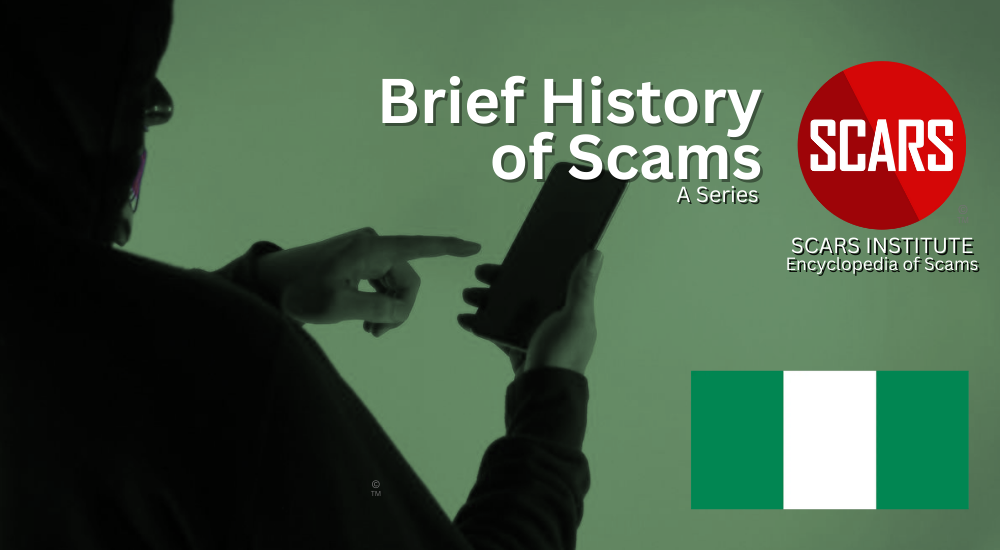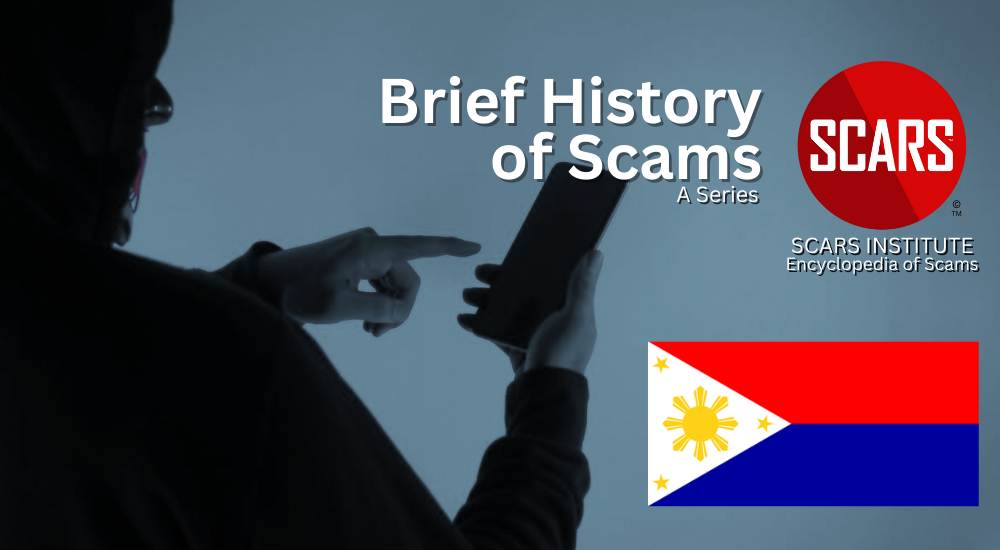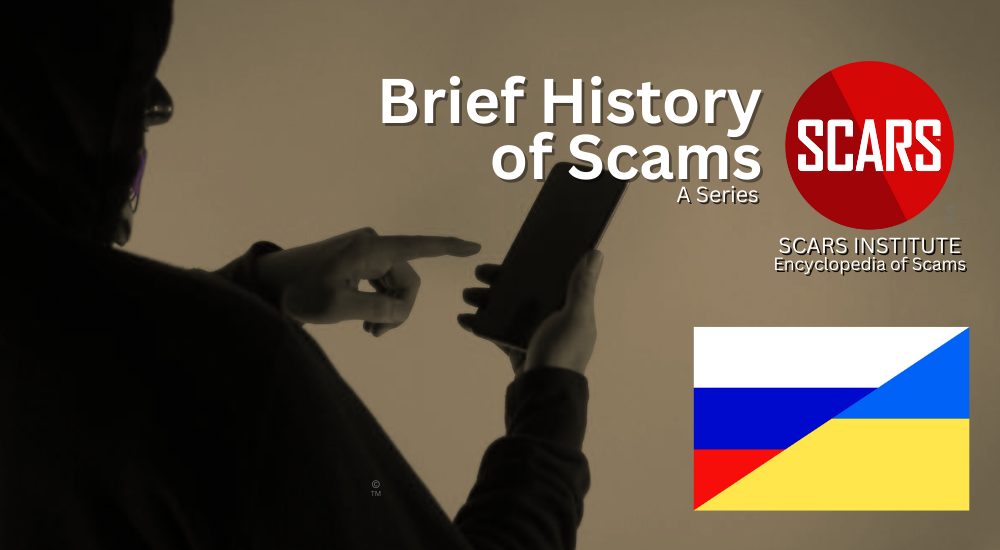
SCARS Institute’s Encyclopedia of Scams™ Published Continuously for 25 Years

A Brief History of Russian Bride Scams/Ukrainian Bride Scams & Scammers
History of Scams- A SCARS Institute Insight
Author:
• SCARS Institute Encyclopedia of Scams Editorial Team – Society of Citizens Against Relationship Scams Inc.
Article Abstract
Russian and Ukrainian bride scams are fraudulent schemes where scammers pose as women from Russia or Ukraine, using fake or real profiles on dating or marriage websites to lure victims, often men from Western countries, into romantic relationships with the promise of marriage.
These scams, which originated after the collapse of the Soviet Union, exploit the economic hardship in the region and the Western perception of Eastern European women as traditional and family-oriented. Scammers establish emotional connections with their victims, eventually requesting money for travel, visas, or emergencies, while having no intention of following through with the relationship.
In many cases, these scams are orchestrated by organized crime groups, making them dangerous and highly lucrative. Even if the “bride” arrives in the victim’s country, the scam may continue, with the victim being manipulated or extorted. These scams have evolved with the rise of the internet and social media, allowing scammers to target more victims globally.

A Brief History of Russian Bride Scams/Ukrainian Bride Scams & Scammers
History of Russian Bride Scams/Ukrainian Bride Scams
A Russian or Ukrainian bride scam is a fraudulent scheme where scammers, often posing as women from Russia or Ukraine, use fake or real profiles on dating or marriage websites to lure victims – usually men, typically from Western countries, into a romantic relationship with the promise of marriage.
The scammers build emotional connections over time and eventually ask for money for various reasons, such as travel expenses, visas, basic expenses, or emergencies, without any intention of following through on the relationship. In many cases, these scams are orchestrated by organized crime groups, making them sophisticated and potentially dangerous for victims, even if the “bride” appears to follow through and come to the victim’s country.
NOTE: These scams have not stopped with the Russian & Ukrainian conflict. Instead, they have moved as people have fled the region to the rest of Europe!
Origins of Russian and Ukrainian Bride Scams
Russian and Ukrainian bride scams have their roots in the social and economic changes that followed the dissolution of the Soviet Union in 1991. As the Soviet Union collapsed, countries like Russia and Ukraine were left in economic turmoil, with high unemployment rates, political instability, and uncertainty. Many women in these countries were looking for better financial opportunities and the prospect of a stable life abroad. This economic hardship coincided with a growing interest among Western men in finding Eastern European brides, who were stereotypically seen as more traditional, family-oriented, and dedicated to long-term relationships compared to women in their own countries.
In the early 1990s, the rise of international marriage agencies and mail-order bride services connected these Eastern European women with foreign men. While many of these services were legitimate and successfully connected couples for marriage, the industry also attracted scammers. The promise of a better life for these women and the desire of Western men to find a loving partner from abroad became the perfect setup for fraudulent schemes to take root.
The Emergence of Russian/Ukrainian Bride Scams
Initially, the internet was not widely available, so scammers used traditional mail and faxes to communicate. Unscrupulous individuals set up agencies that would charge foreign men exorbitant fees to write letters to “brides” who were never real. Men would pay to communicate with these women through intermediaries, sending gifts, and even wiring money for travel expenses, only to find out that the relationships were completely fabricated.
As the internet became more accessible in the late 1990s and early 2000s, these scams moved online. This shift allowed scammers to reach a larger pool of victims, making it easier to create fake profiles on dating sites and engage in communication with multiple men at once. This is where the term “Russian bride scam” or “Ukrainian bride scam” started to gain traction.
How Russian/Ukrainian Bride Scams Work
The basic structure of a Russian or Ukrainian bride scam typically follows a pattern designed to exploit the victim’s emotional investment and financial resources:
- The Initial Contact: A man visits an online dating platform or a dedicated marriage agency that specializes in connecting Western men with women from Russia or Ukraine. The scam often starts with the man receiving a message or interest from an attractive woman whose profile seems perfect. These profiles are typically fake, often using photos of models or stolen images from social media accounts.
- Building Trust and an Emotional Connection: Once the initial connection is made, the scammer begins to build a relationship with the victim. The woman expresses strong interest, shares personal stories, and quickly shows affection or love. Scammers often use charming language and emotional manipulation to make the victim believe they are in a genuine relationship. Over time, the scammer will claim to be deeply in love and eager to meet in person.
- Requesting Financial Support: After the emotional connection is established, the scammer will begin asking for money. These requests are typically framed around plausible scenarios, such as needing money for travel expenses, visa applications, or medical emergencies. The scammer will claim they want to visit the victim in their country but can’t afford the trip, asking the victim to cover the costs. These requests are often gradual, with small amounts at first, building up to larger sums as the scammer gains more trust.
- Prolonging the Scam: Once the scammer has received money from the victim, they will find ways to delay the meeting or cancel travel plans at the last minute, citing emergencies or bureaucratic issues. This allows the scammer to continue asking for more money, keeping the victim on the hook for as long as possible. In some cases, the scammer may introduce other fictional characters, such as a “lawyer” or “immigration officer,” to add legitimacy to their claims and further manipulate the victim.
- The Disappearance: Eventually, when the scammer feels they have extracted as much money as possible, they will either disappear entirely or, in some cases, reveal that they were a scam all along. By this point, the victim is left emotionally devastated and financially drained, with no way to recover the lost money.
The Role of Technology
With the rise of social media and online communication tools, these scams have become even more sophisticated. Scammers can now maintain multiple fake profiles and communicate with numerous victims simultaneously. They can also access more personal information about their victims, allowing them to tailor their manipulation tactics more effectively. Some scammers have even used video calls, employing actors or stolen videos to convince their victims that the relationship is real.
Targeting Vulnerable Victims
Russian and Ukrainian bride scams often target vulnerable individuals, particularly older men who are lonely or seeking companionship. These men may be more trusting and emotionally open, making them easier targets for scammers who know how to exploit their need for connection and love. Scammers play on the victim’s desire for a loving relationship and their perception of Eastern European women as devoted, traditional, and eager to marry Western men.
The Organized Crime Aspect
Russian and Ukrainian bride scams are not merely the work of individual scammers but, in many cases, are part of a much larger and more dangerous criminal enterprise. Organized crime groups, particularly Russian and Ukrainian mafias, have infiltrated and now run a significant portion of these scams, using them as highly lucrative sources of income. These criminal organizations create networks of scammers who work together to lure victims, extract money from them, and in some cases, carry out even more sinister activities after the initial scam has been completed.
The involvement of organized crime introduces an element of danger that extends far beyond the financial losses a victim might suffer. Criminal gangs behind these scams operate sophisticated networks that often involve fake dating websites, fraudulent marriage agencies, and accomplices who pose as “brides” or intermediaries. These organizations have the resources and knowledge to carry out scams that are highly believable, making them all the more difficult to detect. The criminal groups not only profit from the money sent by victims but may also use personal information, such as financial details and identification, for further illegal activities, such as identity theft or blackmail.
One of the most dangerous aspects of bride scams orchestrated by organized crime occurs after the supposed bride arrives in the victim’s home country. In cases where the “bride” follows through and relocates to the victim’s country, the risks for the victim can escalate. In some instances, the women involved are part of the scam themselves, while in others, they may be victims of human trafficking, coerced into participating by criminal organizations. Once in the victim’s home, these women may continue to extort money, manipulate the victim emotionally or even open the victim up to further criminal activities. In extreme cases, victims may face threats of violence or intimidation from the crime networks involved, as these groups are often willing to use whatever means necessary to maintain control and profit.
Furthermore, once married, the criminal element can use the legal complexities of international marriages to their advantage. If the victim tries to leave the relationship or stop sending money, organized crime syndicates may use threats of legal action, harm to family members, or claims to property and assets to force continued compliance.
Summary
The history of Russian and Ukrainian bride scams is rooted in economic hardship and the exploitation of cultural stereotypes. These scams have evolved from traditional mail-based frauds to sophisticated online operations, preying on the emotional and financial vulnerabilities of their victims. Despite efforts to combat this type of fraud, it remains a widespread issue, with scammers continuing to adapt their tactics to deceive new victims. Recognizing the warning signs of these scams and understanding how they operate is crucial for preventing further exploitation.
-/ 30 /-
What do you think about this?
Please share your thoughts in a comment below!
Table of Contents
- Article Abstract
- A Brief History of Russian Bride Scams/Ukrainian Bride Scams & Scammers
- History of Russian Bride Scams/Ukrainian Bride Scams
- Origins of Russian and Ukrainian Bride Scams
- The Emergence of Russian/Ukrainian Bride Scams
- How Russian/Ukrainian Bride Scams Work
- The Role of Technology
- Targeting Vulnerable Victims
- The Organized Crime Aspect
- Summary
LEAVE A COMMENT?
Recent Comments
On Other Articles
- Arwyn Lautenschlager on Love Bombing And How Romance Scam Victims Are Forced To Feel: “I was love bombed to the point that I would do just about anything for the scammer(s). I was told…” Feb 11, 14:24
- on Dani Daniels (Kira Lee Orsag): Another Scammer’s Favorite: “You provide a valuable service! I wish more people knew about it!” Feb 10, 15:05
- on Danielle Delaunay/Danielle Genevieve – Stolen Identity/Stolen Photos – Impersonation Victim UPDATED 2024: “We highly recommend that you simply turn away form the scam and scammers, and focus on the development of a…” Feb 4, 19:47
- on The Art Of Deception: The Fundamental Principals Of Successful Deceptions – 2024: “I experienced many of the deceptive tactics that romance scammers use. I was told various stories of hardship and why…” Feb 4, 15:27
- on Danielle Delaunay/Danielle Genevieve – Stolen Identity/Stolen Photos – Impersonation Victim UPDATED 2024: “Yes, I’m in that exact situation also. “Danielle” has seriously scammed me for 3 years now. “She” (he) doesn’t know…” Feb 4, 14:58
- on An Essay on Justice and Money Recovery – 2026: “you are so right I accidentally clicked on online justice I signed an agreement for 12k upfront but cd only…” Feb 3, 08:16
- on The SCARS Institute Top 50 Celebrity Impersonation Scams – 2025: “Quora has had visits from scammers pretending to be Keanu Reeves and Paul McCartney in 2025 and 2026.” Jan 27, 17:45
- on Scam Victims Should Limit Their Exposure To Scam News & Scammer Photos: “I used to look at scammers photos all the time; however, I don’t feel the need to do it anymore.…” Jan 26, 23:19
- on After A Scam, No One Can Tell You How You Will React: “This article was very informative, my scams happened 5 years ago; however, l do remember several of those emotions and/or…” Jan 23, 17:17
- on Situational Awareness and How Trauma Makes Scam Victims Less Safe – 2024: “I need to be more observant and I am practicing situational awareness. I’m saving this article to remind me of…” Jan 21, 22:55
ARTICLE META
Important Information for New Scam Victims
- Please visit www.ScamVictimsSupport.org – a SCARS Website for New Scam Victims & Sextortion Victims
- Enroll in FREE SCARS Scam Survivor’s School now at www.SCARSeducation.org
- Please visit www.ScamPsychology.org – to more fully understand the psychological concepts involved in scams and scam victim recovery
If you are looking for local trauma counselors please visit counseling.AgainstScams.org or join SCARS for our counseling/therapy benefit: membership.AgainstScams.org
If you need to speak with someone now, you can dial 988 or find phone numbers for crisis hotlines all around the world here: www.opencounseling.com/suicide-hotlines
A Note About Labeling!
We often use the term ‘scam victim’ in our articles, but this is a convenience to help those searching for information in search engines like Google. It is just a convenience and has no deeper meaning. If you have come through such an experience, YOU are a Survivor! It was not your fault. You are not alone! Axios!
A Question of Trust
At the SCARS Institute, we invite you to do your own research on the topics we speak about and publish, Our team investigates the subject being discussed, especially when it comes to understanding the scam victims-survivors experience. You can do Google searches but in many cases, you will have to wade through scientific papers and studies. However, remember that biases and perspectives matter and influence the outcome. Regardless, we encourage you to explore these topics as thoroughly as you can for your own awareness.
Statement About Victim Blaming
SCARS Institute articles examine different aspects of the scam victim experience, as well as those who may have been secondary victims. This work focuses on understanding victimization through the science of victimology, including common psychological and behavioral responses. The purpose is to help victims and survivors understand why these crimes occurred, reduce shame and self-blame, strengthen recovery programs and victim opportunities, and lower the risk of future victimization.
At times, these discussions may sound uncomfortable, overwhelming, or may be mistaken for blame. They are not. Scam victims are never blamed. Our goal is to explain the mechanisms of deception and the human responses that scammers exploit, and the processes that occur after the scam ends, so victims can better understand what happened to them and why it felt convincing at the time, and what the path looks like going forward.
Articles that address the psychology, neurology, physiology, and other characteristics of scams and the victim experience recognize that all people share cognitive and emotional traits that can be manipulated under the right conditions. These characteristics are not flaws. They are normal human functions that criminals deliberately exploit. Victims typically have little awareness of these mechanisms while a scam is unfolding and a very limited ability to control them. Awareness often comes only after the harm has occurred.
By explaining these processes, these articles help victims make sense of their experiences, understand common post-scam reactions, and identify ways to protect themselves moving forward. This knowledge supports recovery by replacing confusion and self-blame with clarity, context, and self-compassion.
Additional educational material on these topics is available at ScamPsychology.org – ScamsNOW.com and other SCARS Institute websites.
Psychology Disclaimer:
All articles about psychology and the human brain on this website are for information & education only
The information provided in this article is intended for educational and self-help purposes only and should not be construed as a substitute for professional therapy or counseling.
While any self-help techniques outlined herein may be beneficial for scam victims seeking to recover from their experience and move towards recovery, it is important to consult with a qualified mental health professional before initiating any course of action. Each individual’s experience and needs are unique, and what works for one person may not be suitable for another.
Additionally, any approach may not be appropriate for individuals with certain pre-existing mental health conditions or trauma histories. It is advisable to seek guidance from a licensed therapist or counselor who can provide personalized support, guidance, and treatment tailored to your specific needs.
If you are experiencing significant distress or emotional difficulties related to a scam or other traumatic event, please consult your doctor or mental health provider for appropriate care and support.
Also read our SCARS Institute Statement about Professional Care for Scam Victims – click here to go to our ScamsNOW.com website.
















Thank you for your comment. You may receive an email to follow up. We never share your data with marketers.